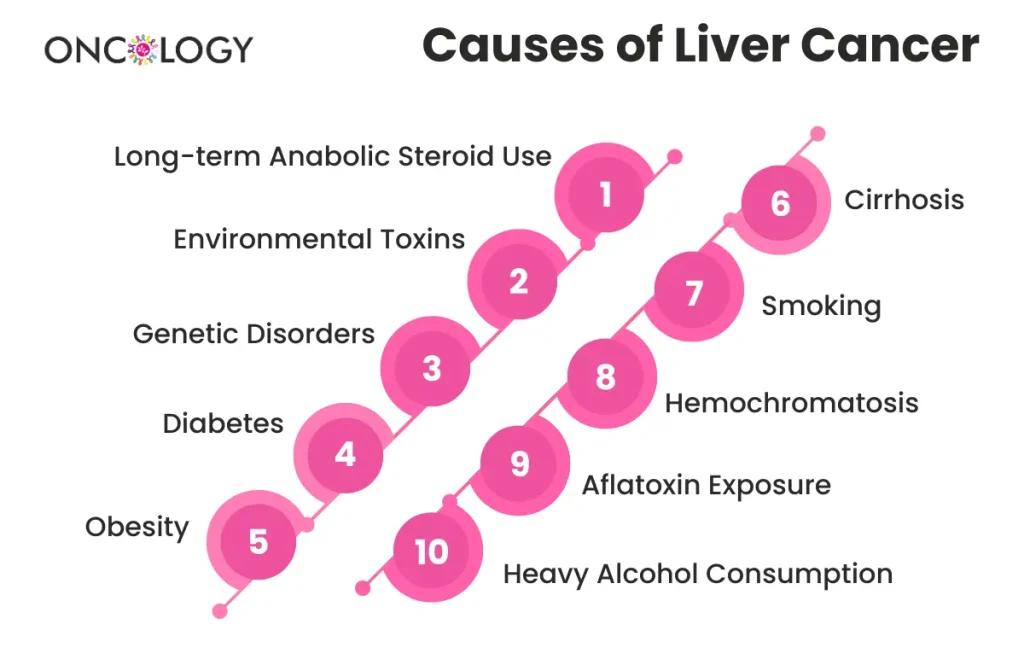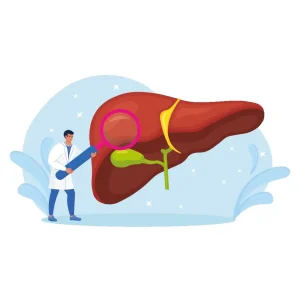Welcome to our comprehensive guide on liver cancer treatment in Chennai. Chennai offers world-class medical facilities and expert professionals dedicated to providing effective treatment and support. With state-of-the-art technology and specialized care, liver cancer treatment in Chennai is designed to cater to individual patient needs. Treatment options range from surgery and chemotherapy to advanced therapies like liver transplants and targeted treatments. Skilled oncologists and support teams ensure personalized care, aiming for the best possible outcomes.
What is Liver Cancer?
Liver cancer is a malignant disease that begins in the liver, an organ vital for filtering toxins, producing bile, and aiding digestion. The most common types are hepatocellular carcinoma (HCC), which arises from liver cells (hepatocytes), and cholangiocarcinoma, originating in the bile ducts. Both conditions can disrupt liver function and require prompt medical intervention for successful treatment, Best liver cancer treatment in Chennai which may include surgery, chemotherapy, or liver transplantation depending on the stage and type of cancer. Early detection improves treatment outcomes significantly.

Functions of the Liver
Understanding the liver’s role in the body emphasizes the importance of timely and effective treatment. The liver performs several vital functions:
- Detoxification: Filtering harmful toxins and drugs from the bloodstream.
- Metabolism: Breaking down fats, carbohydrates, and proteins to produce energy.
- Bile Production: Aiding digestion by producing bile, essential for fat breakdown.
- Storage: Reserving essential nutrients like vitamins and minerals.
- Blood Clotting: Producing proteins necessary for coagulation.
Given these critical functions, timely liver treatment in Chennai can prevent complications and ensure better quality of life.
Stages of Liver Cancer
Liver cancer is classified into Stages of Liver Cancer based on the size and spread of the tumor:
- Stage I: A single tumor confined to the liver, with no spread to blood vessels.
- Stage II: A single tumor that has invaded blood vessels or multiple tumors smaller than 5 cm.
- Stage IIIA: Multiple tumors larger than 5 cm or a single tumor that has invaded a major branch of nearby blood vessels.
- Stage IIIB: Tumors of any size that have invaded nearby organs (except the gallbladder) or perforated the visceral peritoneum.
- Stage IVA: Cancer has spread to nearby lymph nodes but not to distant sites.
- Stage IVB: Cancer has spread to distant organs, such as bones or lungs.
Types of Liver Cancer
Chennai offers a range of advanced options for Liver treatment in Chennai. Depending on the stage and type of liver cancer, specialists recommend tailored therapies. Best liver cancer treatment in Chennai Below are the primary types of treatment available:
Surgical Options
- Liver Resection: Removing the cancerous portion of the liver while preserving healthy tissue.
- Liver Transplant: Replacing the diseased liver with a healthy donor liver, often recommended for advanced cases.
Ablative Therapies
- Radiofrequency Ablation (RFA): Using heat to destroy cancer cells.
- Cryoablation: Freezing and eliminating cancerous tissues.
Radiation Therapy
- Stereotactic Body Radiotherapy (SBRT): Targeting cancer cells with high doses of radiation while sparing healthy tissue.
- Selective Internal Radiation Therapy (SIRT): Delivering radiation directly to the tumor via the bloodstream.
Systemic Treatments
- Chemotherapy: Administering drugs to kill or slow the growth of cancer cells.
- Targeted Therapy: Using drugs designed to attack specific genetic mutations in cancer cells.
- Immunotherapy: Enhancing the immune system’s ability to fight cancer.
Advanced Interventional Techniques
- Transarterial Chemoembolization (TACE): Delivering chemotherapy directly to the tumor and blocking its blood supply.
- Transarterial Radioembolization (TARE): Combining radiation with embolization for more effective outcomes.
Chennai’s medical institutions specialize in offering advanced liver cancer treatment in Chennai, combining traditional approaches with the latest innovations to ensure the best outcomes.
Risk Factors
Understanding the risk factors associated with Liver Resection can help individuals take preventive measures:
- Chronic hepatitis B or C infection
- Cirrhosis
- Heavy alcohol consumption
- Obesity
- Diabetes
- Exposure to aflatoxins
Understanding these risk factors is crucial for both prevention and management strategies during liver cancer treatment in Chennai.
Diet and Nutrition
While diet alone cannot prevent liver cancer, maintaining a healthy diet can support overall health and well-being:
- Balanced Diet: Consuming a balanced diet rich in nutrients is essential for patients undergoing liver cancer treatment. This includes incorporating a variety of fruits, vegetables, lean proteins, and whole grains into their meals.
- Hydration: Staying hydrated is important for liver health. Patients should aim to drink plenty of water throughout the day to maintain proper hydration levels.
- Limiting Certain Foods: Patients should limit their intake of processed foods, sugary beverages, and foods high in saturated fats and cholesterol. These foods can contribute to inflammation and may worsen liver function.
- Alcohol Consumption: It’s crucial for patients with liver cancer to abstain from alcohol consumption entirely or limit it to minimal amounts, as alcohol can further damage the liver.
- Small, Frequent Meals: Eating smaller, more frequent meals throughout the day can help alleviate symptoms such as nausea and loss of appetite, which are common side effects of liver cancer treatment.
- Nutritional Supplements: In some cases, patients may require nutritional supplements to meet their dietary needs, especially if they are experiencing weight loss or malnutrition due to the treatment.
Sign and Symptoms of Liver Cancer
Liver cancer often presents with a range of signs and symptoms that may be subtle in the early stages. Common symptoms include:
- Weight Loss: Unintentional and significant weight loss without changes in diet or exercise.
- Loss of Appetite: A noticeable decrease in the desire to eat.
- Upper Abdominal Pain: Persistent pain or discomfort in the upper right portion of the abdomen.
- Swelling or Bloating: An enlarged Liver Resection or fluid accumulation (ascites) in the abdomen, causing visible swelling.
- Jaundice: It manifests as yellowing of the skin and eyes, indicating liver dysfunction.
- Nausea and vomiting: It occur frequently in liver cancer patients.
- General Weakness and Fatigue: Persistent tiredness and weakness that affect daily activities.
- Enlarged Spleen: Sometimes, liver cancer can cause the spleen to enlarge.
- Dark Urine: Darkening of the urine due to liver dysfunction.
These symptoms can be indicative of liver cancer or other liver-related conditions. Advanced Liver Cancer Treatment in Chennai Early detection and medical consultation are crucial for effective treatment and management.
Prevention of Liver Cancer Treatment in Chennai
Liver cancer is a serious condition that can significantly impact health and quality of life. Best liver cancer treatment in Chennai However, many cases can be prevented through lifestyle changes and regular medical screenings. Here are some key preventive measures:
- Avoid Risk Factors:
- Limit Alcohol Consumption: Excessive alcohol intake can lead to cirrhosis, a major risk factor for liver cancer.
- Avoid Exposure to Hepatitis B and C: These viral infections significantly increase the risk of liver cancer. Get vaccinated against hepatitis B and practice safe behaviors to avoid hepatitis C.
- Healthy Lifestyle:
- Maintain a Healthy Weight: Obesity can lead to fatty liver disease and increase cancer risk.
- Regular Exercise: Engage in regular physical activity to maintain overall health and reduce cancer risk.
- Regular Medical Check-Ups:
- Screening: If you have chronic liver disease or other risk factors, regular screenings can detect liver cancer early when it’s most treatable.
- Manage Chronic Conditions: Proper management of diabetes and other chronic conditions can reduce the risk of liver cancer.
- Avoid Toxins:
- Minimize Exposure to Aflatoxins: These toxins, found in contaminated food, can increase liver cancer risk. Ensure proper food storage and handling.
Adopting these preventive measures Liver treatment in Chennai can significantly reduce the risk of liver cancer and contribute to overall liver health.
Diagnosis
Diagnosing liver cancer typically involves a combination of medical history review, physical examination, and diagnostic tests:
- Imaging examinations such as CT scans, MRIs, and ultrasounds.
- Blood tests to detect liver function and tumor markers.
- Biopsy is conducted to verify the existence of cancerous cells.
Prompt diagnosis is crucial for determining the appropriate course of liver cancer treatment in Chennai.
Key Services
Chennai offers a range of key services to support patients undergoing liver cancer treatment:
- Surgical procedures such as liver resection and liver transplantation are among the options available for treatment.
- Chemotherapy treatment and targeted therapy options.
- Interventional radiology procedures like radiofrequency ablation and transarterial chemoembolization (TACE).
- Palliative care and pain management services.
- Nutritional counseling and supportive care programs.
These services aim to provide comprehensive care and improve the quality of life for patients undergoing liver cancer treatment in Chennai.
Key Facilities
Chennai is home to some of the top medical institutions providing the best liver cancer treatment in Chennai. These facilities stand out for their advanced infrastructure and patient-centric care.
- Specialized Oncology Departments: Equipped with multi-disciplinary teams including oncologists, hepatologists, and surgeons.
- Modern Diagnostic Tools: Advanced imaging technology like MRI, CT scans, and PET scans for accurate diagnosis.
- Robotic Surgery Units: Minimally invasive robotic-assisted procedures ensure precision and quicker recovery.
- Comprehensive Care Units: Facilities offering chemotherapy, immunotherapy, and targeted therapy under one roof.
- Post-Treatment Rehabilitation: Support services such as counseling, dietary planning, and physiotherapy for holistic recovery.
For anyone seeking advanced liver cancer treatment in Chennai, these facilities provide the necessary infrastructure to ensure high-quality care.
Conclusion
Liver cancer treatment in Chennai encompasses a multidisciplinary approach aimed at effectively managing the disease and supporting patients throughout their journey. With access to advanced medical facilities, skilled professionals, and supportive services, individuals facing liver cancer can find hope and quality care in Chennai. Remember, early detection and timely intervention are crucial, so don’t hesitate to seek medical advice if you have concerns about liver health.

